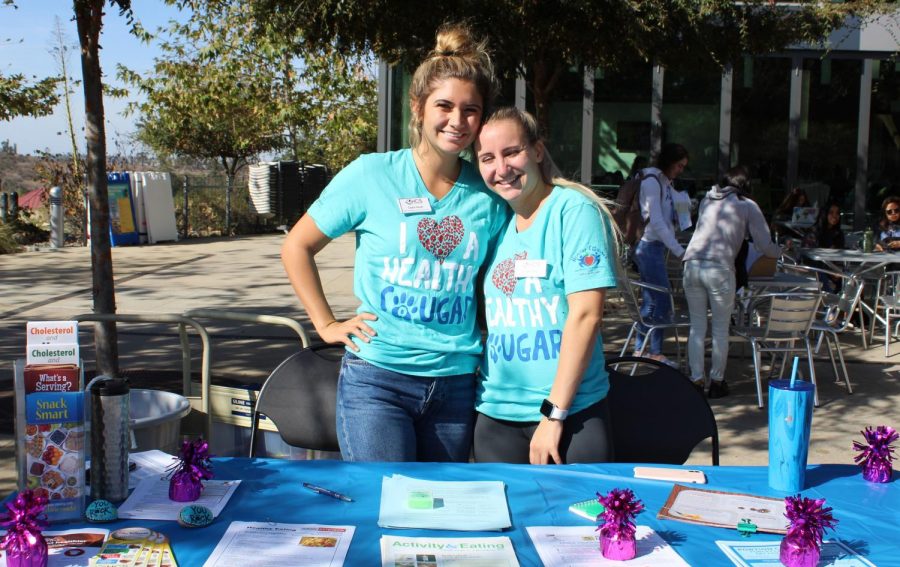Organizations inform students on health and wellness for the holidays
Stralen Cayla Haupt (left) and Taylor Stark (right) provide students with tips for healthy eating.
Eat Well Eat Wise educated students on healthy eating during the holidays and provided resources from local health organizations to those suffering from eating disorders at the USU on Nov. 26 from 11:30 a.m. to 1 p.m.
The event, hosted by the Student Health and Counseling Services (NCHS), was organized into several tables where students were able to interact with representatives from various local health organizations.
Eat Well Eat Wise spread awareness of proper nutrition and emphasized the prevalence of eating disorders.
Linda Puebla, a representative from the NCHS who helped lead the event, explained that eating disorders may be more common and complex than what people may assume. She said, “Eating disorders are not always starving yourself. Sometimes it’s binging and having so much to eat. Sometimes it’s the complete opposite. It’s a spectrum really.”
Puebla said the theme of over-eating comes with the rush of the holiday season and might trigger episodes of starving or binge-eating. From this event, she said that she hopes to inform students of a balanced eating lifestyle.
“What we’re doing is giving little tips on eating healthy right before the holidays … Right now may be a really hard time for people with eating disorders … because of the holidays coming up,” said Puebla.
Healthy tips were given to students in the form of recipes and nutrition guidelines by fellow intern Cayla Haup, who said that the importance of knowing healthy eating methods may apply to many students on campus.
“I feel like a lot of college students when they come to college they’re living on their own and they have to fend for themselves and cook for themselves. So I think it’s beneficial to have a little guide,” said Haup.
Nikki Hernández a graduate intern of student conduct at the Dean of Students office represented the Cougar Care Network. Hernández explained that the Cougar Care Network is a network that serves as a bridge for students and the care that they need.
Hernández said, “The Cougar Care Network is a team that’s all about supporting students and advocating for our students. So students that need help with resources, whether that has to do with housing, financial aid, mental health … We want our students to know that we’re there for them.”
Connie Martínez, a community outreach worker, represented the NCHS. According to Martínez, the NCHS range in locations from Carlsbad to San Marcos. These series of clinics are made up of non-profit health centers that are federally qualified.
Martínez said that the services provided at NCHS include midwife services, family planning and psychiatric care.
Martínez also said that these healthcare services are available for students and can be made affordable. “A lot of students on campus range from the ages of 18 to 30, roughly. Some of them are on their parent’s health insurance, but what happens when you hit the age of 26 and you need help navigating that route? … We have program resource specialists who help out college students for free to enroll in medical and other healthcare plans too,” said Martínez.
Martínez further shared that the local NCHS also provides students opportunities to be more involved with the community and to earn a positive real world experience. “We have volunteer opportunities as well. So it’s a lot of things for students on campus. They can intern with us too … to help those individuals who are unable …”
For more information about student health and support services, visit:https:// www.csusm.edu/ccn/index. html.


